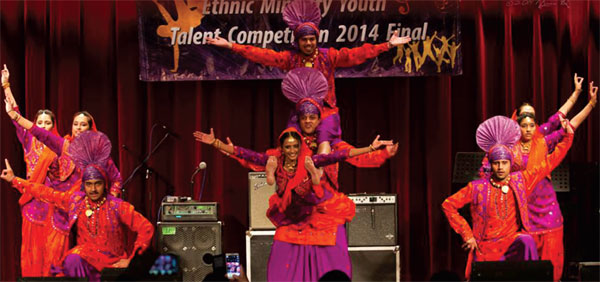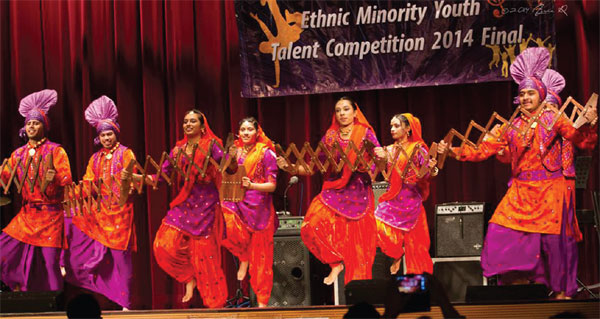The turbanators' day
Updated: 2015-01-21 09:22
By Frannie Guan(HK Edition)
|
|||||||||
A group of youngsters with roots in the Indian state of Punjab won a talent competition in HK by staging a high-energy traditional bhangra performance. Frannie Guan reports.
As the sound of dhol (Indian drum) rose to a crescendo, Harry Baath raised his arms, elbows slightly bent. He was sitting on the shoulders of Naveed Ahmed, hoisting Jaswinder Kaur, another member of the dance troupe, by putting his feet under her armpits. Kaur had her legs entwined around Ahmed's torso. The tableau triggered enthusiastic applause from the audience.
Baath, 29, was one in a group of eight, performing at the final round of ethnic youth talent competition 2014, organized by Democratic Alliance for Betterment of Hong Kong (DAB). Unlike other participants who did stuff familiar to the local audience - pop songs, contemporary dance, band performance - Baath's team, Funjabi Hong Kong, chose bhangra, a folk tradition from the state of Punjab in India. The judges were impressed.
Although most of their parents arrived in Hong Kong from Punjab, Baath and his teammates were born in Hong Kong. Stories recounted by parents and the odd cultural event held at the Sikh temple they frequent are about the only way they have a glimpse into the culture they come from.
"When I was 10, my parents played a movie on the history of Punjab at home. It was about the Sikh heroes of war and their sacrifices," said Jaswinder Kaur, 23, a Funjabi member since six years ago. The movie stirred an intense wave of emotion inside her. For the first time in her life she felt proud of being a Punjabi.
The dance steps were not difficult to learn, partly because she came from the same culture but perhaps more so because she had seen her father put on the music and do a few steps since she was a child.
Funjabi was started by Baath and two of his friends in 2006. About 10 years ago he auditioned for bhangra dancers for an India activity show organized by Hong Kong Punjab community. They invited an Indian instructor to teach the participants to take baby steps - from basic moves to folk dancing. Baath knew very little about bhangra dancing at that point, but the more he practiced, the more interested he became in the folk tradition.
"After a good harvest, Punjab people get dressed in traditional costume, gather together and start dancing," said Baath. By picking up the bhangra steps, Baath got a sense of the robust energy that went into the celebration.
Funjabi members meet every week - after work or school - to practice in a room provided by Caritas Community Centre at Prince Edward. The dance team has grown from three members to 16, with an age range of 16 to 30.
Artists, not terrorists
Baath would like Funjabi to perform in different locations in Hong Kong and beyond. He hopes to change the prejudices certain people seem to hold against Sikhs. "Sometimes people suspect us to be terrorists or see us as a threat because we wear turbans. We hope to change the stereotypical notion about Sikhs," said Baath.
After the Sept 11 terrorist attacks in New York in 2001, he would often get asked, "Are those terrorists from your religion?" It was because his father, a practicing Sikh, would wear a turban all the time.
The Hong Kong 2010 yearbook shows the city has around 10,000 believers in Sikhism.
Watching Funjabi members dance in gaily colored costumes with matching turbans is a delight indeed. They source these from Punjab.
Apart from the turbans, bangles, made of steel or iron and handed out at temples, is another mark by which one could tell a Sikh. Hussandeep Singh, 18, a Funjabi member, wears a bangle on his right wrist even when he is not dancing. "Though it is not a must, I like to wear it because it is one of the things by which you could identify a Sikh," said Singh.
Legislative Council member Ann Chiang Lai-wan, one of the judges of the competition, was fascinated by the Funjabi's performance of a folk dance number. "Ethnic people from South Asia have great talent for performing on stage," said Chiang. "This competition is for them to show their talent and enthusiasm."
Predictably, Funjabi won the contest. Baath attributes the success to hours of practice, despite the demands of school and work.
"My father always told me people whose roots were not strong will never succeed in life. So wherever I go I should never forget my background," said Singh. Doubtless, this is a moment of pride for Funjabi members. The new award in their kitty will add more confidence and determination to each step they take from this point on.
Contact the writer at frannie@chinadailyhk.com

|
Acrobatic marvels performed by Funjabi Hong Kong drew enthusiastic applause from the audience at Ethnic Minority Youth Talent Competition 2014. Provided to China Daily |
|
Hong Kong-born members of the Sikh community can relate to a tradition their parents left behind in India through bhangra dancing. Provided to China Daily |
(HK Edition 01/21/2015 page6)

